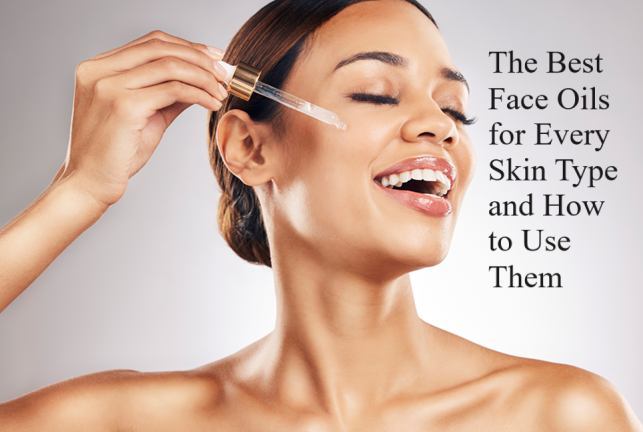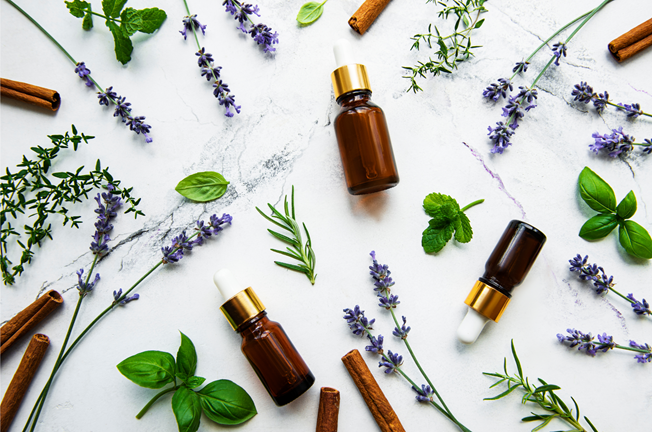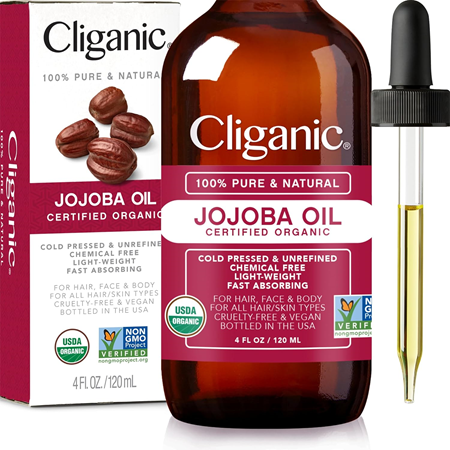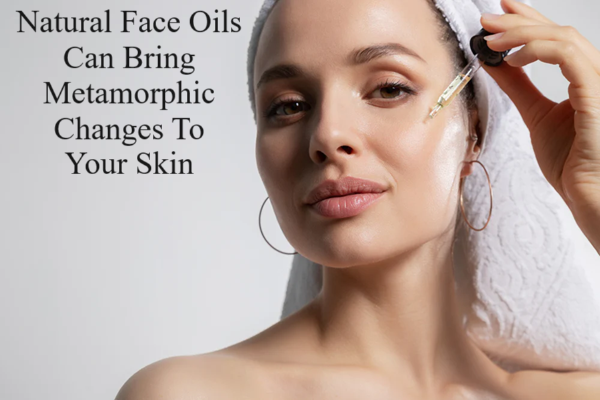We include products we think are useful for our readers. However, when you buy something through our retail links, we may earn an affiliate commission.
A Complete Guide
To Botanical Facial Oils
A complete guide to botanical facial oils that takes the guesswork out of these natural and powerful elixirs, and the effective benefits that plant oils have to offer your skin.

Your Guide To Botanical Facial Oils,
How To Correctly Use Face Oil,
And The Natural Powerful Benefits
Natures Elixirs Have To Offer
In this guide to botanical facial oils you will understand everything there is know about face oils, how to use them, why to use them, when to use and what to avoid.
Using face oils correctly will lead to several benefits. It will enhance your appearance, improve the skin's barrier function, reduce symptoms of dermatitis, prevent trans-epidermal water loss, and protect against environmental damage.
Facial oils offer radiant vibrancy that defies age, ensures the reduction of fine lines, and rewards you with a firm, supple, tightened complexion. It’s precisely the kind of historical, medicinal touch your skin needs to grow healthier and younger. These oils also enhance the performance of your other skincare products by improving absorption.
This guide serves to inspire a positive integration
of facial oils into your skincare routine, one that will yield visible,
transformative results. Understanding your skin type and the
facial oils that best cater to it is the first step towards unleashing
the full potential of these magical elixirs.
The road to beautiful and perfectly healthy skin starts with knowledge, but it continues with the right products. Not all oils are created equal, and the key to enjoying the maximum benefits lies in choosing the most suitable ones for your individual skin needs.
Facial oils play a significant role in combating various skin problems. Their soothing and nourishing qualities help to maintain balance and perpetuates a radiant, healthy glow.
From hydration and moisture to glow and radiance, facial oils have the remarkable ability to revolutionize the texture and appearance of your skin in numerous ways. As a much-underrated skincare hero, their potential to turn around your skincare game is enormous.
What Are Botanical Facial Oils?
These plant-based facial oils are nutrient-rich elixirs derived from natural sources, intended to augment your skin's health and vitality. They constitute complex mixtures of potent botanical extracts, essential fatty acids, and antioxidants that encourage healthy skin function, improvement of skin texture, radiance, and resilience.
Facial oils hold a
plethora of benefits. They can deeply nourish and help the skin stay plump and hydrated by
locking in moisture and nutrients from other skincare products. Face oil also serves as a protective barrier for our skin and
help balance your natural oil production,
and help calm down inflammation.
Botanical oils work by duplicating the lipid barrier of your skin. This imitation helps lock in moisture and nutrients, reducing the potential for water loss. Also, their antioxidant properties protect your skin from the harsh realities of the environment: UV rays, pollution, and even blue light exposure.
Face oils are made with a mixture of plant oils and other ingredients that are very beneficial for the skin.
The Benefits Of Using Facial Oils
And What They Do For Your Skin
Face oils are multitaskers: they provide your skin with an extra
layer of protection to trap in moisture while also addressing a host of
other skin concerns. The benefits of using face oils include the
following:
- Stimulates collagen production to minimize wrinkles
- Protects skin from free radicals with anitioxidants
- Gives your skin an instant softness and smoothness
- Strengthens and maintains elasticity with fatty acids
- Evens out your complexion and corrects discoloration
- Brightens and promotes a fresh glow in mature or dull skin
- Creates a dewy finish when added before (or with) foundation
- Feeds your skin with essential nutrients
- Attracts and seals in moisture
While these benefits can be expected across the board, each type of face oil has different qualities to consider.
How to Choose the Right Facial Oil

Best Face Oils For Your Skin Type And Concerns
Can Oily And Acne Prone Skin Use Face Oil?
The answer is yes. You can use plant oils. In fact, they can be a great addition to your skincare routine. The below botanical face oils are a lighter oil that will actually help regulate sebum production and they won't clog pores.
|
|
Botanical Facial Oils For Dry Skin
- Coconut Oil: Is deeply moisturizing, giving your skin the hydration it so desperately needs. Be careful with this oil it is comedogenic with potential for pore-clogging.
- Sweet Almond Oil: Contains oleic acid, B-sitosterol, and a-tocopherol. Oleic acid makes it easier for the oil to sink deeper into the skin. It is gentle and helps dry skin including eczema while hydrating the skin.
- Jojoba Oil: Could be considered the universal oil as it is a mega multitasker. For example, it's moisturizing and attracts water, it has antifungal and antimicrobial properties, it's an antioxidant, it's non-comedogenic, it's hypoallergenic, controls sebum, promotes collagen synthesis, speeds up wound healing, may help treat acne, and reduces appearance of wrinkles and fine lines, helps reduce scars and helps soothe eczema, psoriasis and other drying skin conditions.
Best Facial Oils For Combination Skin
There are a few oils that closely mimic the natural sebum that skin produces, which is great for combination skin. Jojoba oil is the closest, followed by squalane oil derived from plant oils such as; sugar cane, rice bran, olive or amarnath. Due to the controversy and ethical reasons many cosmetic companies have shifted away from shark-dervied squalene in their products. The following oils are best known for their excellent emollient (skin softening) properties among many other benefits.
- Jojoba Oil: See above
- Squalane Oil:
A powerful anti-aging and anti-inflammatory face oil resembling your natural sebum, it is also a powerful emollient, which means it offers skin-smoothing and softening benefits. It is absorbed quickly and easily and protects against free radical
- Sweet Almond oil: Has the ability to stimulate the production of new skin cells and smooth fine lines, nutrient rich antioxidant properties that may help prevent cell damage, may help prevent premature aging and safeguard against sun damage.
- Sunflower Seed Oil: Can help restore balance and increase hydration without promoting excess oil production, can help to dissolve and displace the dirt and sweat that can settle into pores. With regular use, sunflower oil has been shown to be an excellent remedy for cleansing out deep-seated impurities such as makeup residue, sunscreen, and dead cells, which can clog your pores and cause acne. However, it doesn’t remove your skins natural oil, meaning that it won’t leave your skin feeling dehydrated.
If You Have Skin Sensitive or Irritated Skin
- Camellia Oil: Is particularly well suited for people with sensitive skin because of its rich phytonutrients and fatty acid profile.
- Jojoba Oil: Is a great option for sensitive skin that is also prone to breakouts or clogged pores due to the fact that it is non-comedongenic and helps balance sebum.
- Argan Oil: A perfect oil for those with sensitive skin and acne-prone, as it is not irritating and non-comedogenic.
- Chamomile Essential Oil: A powerful anti-oxidant which
includes polyphenols and phytochemicals. It is great as an
anti-inflammorty for soothing and calming irritated skin. Should be used with a carrier oil such as jojoba.
- Rosehip Seed Oil: Can help brighten your skin, prevents breakouts and reduce inflammation.
Mature Skin
Since mature skin is usually dry, all the same face oils recommended above for dry skin make it onto this list too. These include squalane, which makes its way onto the top of every "best face oils" list because it occurs naturally in our bodies.
- Mature Skin Face Oils:
The best facial oils for anti-aging skin is one that contains natural
organic ingredients like rosehip seed oil, argan oil, and jojoba oil.
- The Anti-Aging Power Of Pomegranate Seed Oil: Boosts collagen
production, enhances skin elasticity and hydration while promoting the
reversal of skin damage. It also helps promote even skin tone, and
delays the signs of aging. You can either get it as a carrier oil or a essential oil. If buying it as an essentail oil, you should mix it with a carrier oil such as jojba oil.
When it comes to acidic oils like lemon oil or grapefruit oil, always remember that sun exposure after application can lead to sunburns and hyperpigmentation. Always follow up with an SPF and use such oils in your nighttime routine if possible.
When Is The Best Time To Use Face Oils?
To see optimal results, incorporate facial oils into your everyday skincare regimen. You can apply facial oil after the moisturizer to lock in all the goodness of your skincare products, or you can mix a few drops of it with your moisturizer before applying it to your face.
Remember, when using facial oils, moderation is key. A drop or two is usually enough to cover your whole face. It is always best to conduct a patch test before the full application to check how your skin reacts to the oil.
Facial oils tend to take longer to absorb than creams, so apply them at least a couple of minutes before applying makeup or retiring to bed so that the oil has time to sink in and work its magic.
Time matters when using facial oils. Morning application can provide a protective barrier, preventing daily pollutants from reaching your skin. Evening application provides an overnight nutrition feast for your skin, where the body naturally undergoes repair and rejuvenation.
Seasonally speaking, oils can assist in protecting your skin during winter, when cold air tends to strip skin of its natural oils. When humidity levels rise in summer, you may want to switch to lighter oils or lessen the amount of oil used to avoid excess glossiness.
Massage the oil into your face using upward strokes and don't forget your neck area. The gentle massage helps stimulate blood circulation and promotes a healthy, radiant complexion.
When To Use Facial Oil In Your Skincare Morning and Night Routines
When To Layer Facial Oil In Your Morning Routine
1. Cleanser: Start your day with a gentle cleanser to remove any oil build-up from the night and prepare your skin for the next steps of your routine.
2. Toner: If you use a toner, apply it next. It further cleanses the skin and helps subsequent skincare products penetrate more deeply.
3. Serum: Serums are packed with active ingredients that tackle specific skin concerns. Apply your serum of choice to help address issues like acne, dullness, or aging signs.
4. Moisturizer: Next, apply a moisturizer to seal in the oil and provide extra hydration. Even if your skin feels hydrated after the oil, it's still crucial to use a moisturizer, particularly for dry or sensitive skin.
5. Facial Oil: Apply your facial oil after your serum. It will help lock in the serum's benefits and provide a layer of protection against environmental stressors. It's best to use a few drops and gently pat it into your skin until it's fully absorbed.
6. Sunscreen: Finally, protect your skin with a broad-spectrum sunscreen. This step is essential even if your moisturizer or foundation includes SPF.
When To Layer Face Oil In Your Nightly Routine
1. Double Cleanse: Begin with an oil-based cleanser to dissolve makeup and follow up with a water-based cleanser to remove any leftover residue.
2. Exfoliate/Toner: Use a gentle exfoliator or toner to remove dead skin cells and help your skin absorb the following products better.
3. Treatments or Serums: Apply any night-specific treatments or serums that address your skin concerns.
4. Moisturizer/Night Cream: Finish with a moisturizer or night cream. Some people like to mix their facial oil with their night cream for easier application.
5. Facial Oil: Apply your Face Oil to lock in the benefits of your treatments or serums. Again, a few drops gently patted into your skin should be enough.
6. Eye Cream: Lastly, don't forget your eye area. Apply an eye cream for extra hydration and to address any specific concerns like dark circles or puffiness.
Best Ingredients To Look For
In A Powerful And Natural Face Oil
When looking for face oil, we recommend choosing premium-quality products rather than cheaper alternatives. Opt for oils that contain vitamin E and rich fatty acids, such as those present in coconut and rosehip oils. It’s also a good idea to select products that contain antioxidants and vitamin C, as they will protect your skin and reduce ageing signs. Vitamin E also has anti-inflammatory properties, so it can protect your skin from infections and alleviate different skin conditions. It’s recommended to search for oils containing jojoba oil as well since it’s very similar to the sebum that is naturally produced by our skin.
When purchasing a plant powered facial oil, always check the ingredients. Pure oils will list only one ingredient, while blends will list several. If the oil is scented, ensure that fragrance is listed at the end. High fragrance content can potentially irritate the skin.
Also consider the packaging of the oil. Transparent bottles can make oils susceptible to light damage hence reducing their potency. Look for oils in dark bottles or opaque packaging for better shelf life.
Jojoba Oil The #1 Best Universal Botanical Oil For Every Skin Concern and Type
Guide To Botanical Facial Oils Key Take Away
Key Take Aways From Your Guide To Botanical Facial Oils And Harnessing Their Anti-Aging Powers.
- Face oils are made with a mixture of plant oils and other ingredients that are very beneficial for the skin. They help the skin stay plump and hydrated by locking in moisture and nutrients from other skincare products. Face oil also serves as a protective barrier for our skin. But in order to feel these benefits, you need to use face oil correctly.
- You can use face oil every day or even twice a day. Face oil should be the last layer of your skincare routine, so you need to apply it after your moisturizer. You can also mix a few drops of your favorite natural face oil with your moisturizers.
- Face oils don’t work very well when layered on top of moisturizers that contain SPF, so if you want to use a face oil, make sure to apply it underneath sunscreen.
- When choosing a face oil, look for products that contain antioxidants and fatty acids. Jojoba oil is especially beneficial since, chemically, it’s very close to our natural face sebum. Vitamins E and C are also excellent face oil ingredients, as they have potent anti-inflammatory properties and help to combat ageing signs.
Facial oils are some of the most effective skincare products that nourish our skin and make it appear healthy and glowing by preventing the skin from losing moisture. Hope the tips in this complete guide to botanical facial oils has brought light to the subject and gave you a clearer understanding of the benefits these great oils offer your skin.
Learn more visit NIH.gov on the therapeutic benefits of plant oils.
Indulge skin with the natural powers in this guide
of botanical facial oils, your face will thank.
Share your favorite oil or guide to botanical facial oils.
Best Anti Aging Product That Works For You?
Share Your Review, Tip or Story!
Share Your Review, Tip or Story!
Read More
Keywords: guide to botanical facial oils, complete guide to botanical facial oils, a guide to botanical facial oils
Recent Articles
-
Guide To Botanical Facial Oils And Harnessing Their Anti-Aging Powers.
Feb 07, 24 06:48 PM
A complete guide to botanical facial oils that takes the guesswork out of these magical elixirs, and the powerful benefits that plant oils have to offer your skin. -
Is Exfoliating Your Skin Important? The answer is yes! Especially if..
Dec 29, 23 11:29 PM
Exfoliating your skin is important to help determine how radiant, healthy and younger looking our skin will feel and look so, exfoliating it is an important step in our skincare routine.. -
Healthy Water, What Is The Best Healthiest Drinking Water?
Dec 29, 23 01:11 PM
Healthy water keeps our cells regenerated, replenished and plump giving them the energy to rebuild and function properly. You want to give your body the best possible water available, right?









